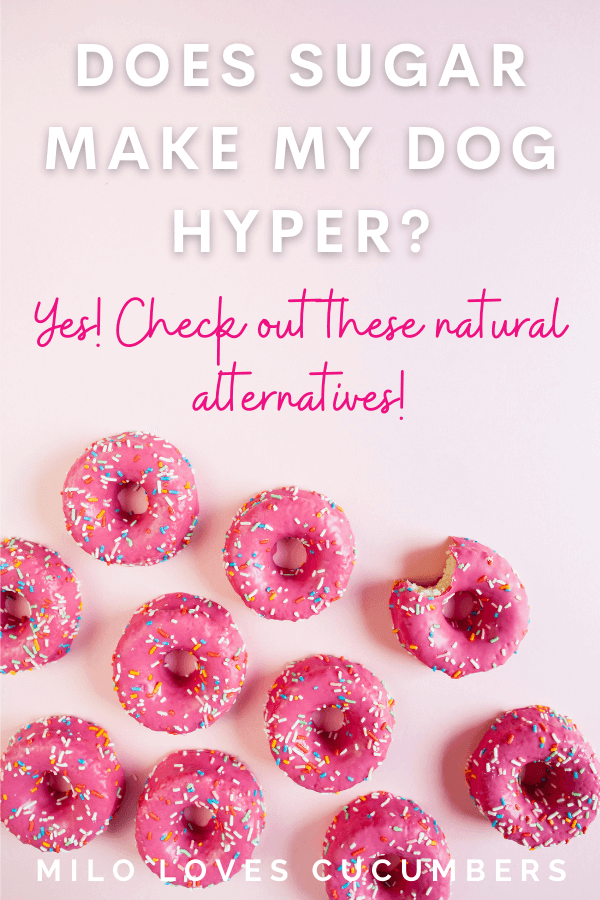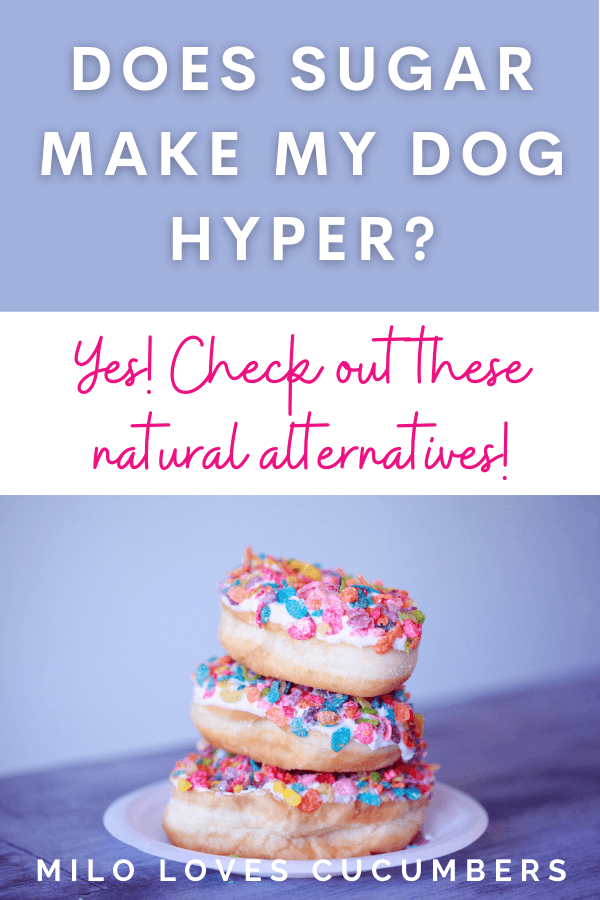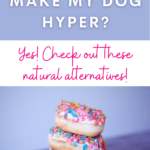The other day I was at the dog park with Milo and I noticed another dog owner sharing her chocolate milkshake with her pup. Of course, Milo headed straight that way, giving that owner the biggest puppy dog eyes he could muster up. My immediate reaction was, no – please don’t let him have any – he’s already hyper enough as is. But that owner seemed so nonchalant about it that it left me wondering – does sugar make dogs hyper?
The simple answer is, yes – sugar makes dogs hyper. Too much sugar can lead to hyperactivity, diabetes, obesity, and tooth decay – just like in humans. Upon research, I discovered that a little amount of sugar daily won’t hurt. But, just like humans, dogs have taste buds which react to sugar in a similar fashion. Dogs do become hyper if they take in large amounts of sugar.

Disclosure: This post may contain affiliate links. If you purchase a product through one of our affiliate links we make a small commission from the sale at no extra cost to our readers.
Like children, dogs love their addictive sugary snacks which release dopamine bringing our furry animals to their happy place. You’d even be surprised how many processed dog foods contain sugars.
Just remember to think about what’s normal for your dog’s temperament and breed – some dogs are naturally more hyper than others!
Sugar Leads to Hyperactivity
A dog’s body functions similarly to that of humans.
Can you imagine a child who has had a lot of candy before bedtime? Surely they will be up all night long, bouncing off the walls. The same is the case with your fur baby.
Sugar is carried to all the cells in the body through the blood in the form of glucose. Believe it or not, most commercial dog foods even contain sugar. So, even if you intend for your pup not to have something sweet, he would be indirectly ingesting it if you buy certain mainstream doggie products.
Glucose can also come from carbohydrates which break down much quicker in the body. This causes a surge in blood glucose levels. This results in lowering your canine’s serotonin which results in hyperactivity and mood swings.
And, just like in people, once the sugar rush begins to wear off, you might have noticed that your pooch becomes sleepy, lethargic, temperamental, unfocused and uncooperative. Obviously going through the same sugar-crash that we do when we have too much sugar.
Once this happens, your pooch will want another dose of sugar to bring his energy back up – and the cycle continues from there.
That’s why it’s better to lay off the sugary food items and introduce other alternate natural treats.
Sugary Foods that are Toxic for Dogs
Imagine those big brown eyes looking up at you while you enjoy your pumpkin pie during the holidays.
Like any doggie mama, my heart melts when I see those eyes. But think twice about sharing your dessert with your pup. As mentioned above, sugar can cause obesity and dental decays in dogs. It can even cause diabetes.
Plus, just like humans, dogs tend to have a sweet tooth since sugar is such an addictive substance.
And while some sweeteners are perfectly safe for dogs, others can have severe adverse effects on your dog’s health and have also proven to be fatal.
Like any parent, remember to read the label before you offer your dog a sweet treat at home. Especially when it comes to the most commonly used artificial sweetener – Xylitol.
Xylitol Hazard For Dogs
Xylitol is an artificial sweetener which is used commonly in many sugar-free items such as ice creams, candies, juices, desserts and yogurts. Even peanut butter often contains Xylitol.
But, according to the American Kennel Club, it is extremely toxic and fatal for dogs. The scary reality is that Xylitol can drop your dog’s blood sugar level and even result in liver failure. If your fur baby consumes even a small dose of Xylitol accidentally, it can result in immediate seizures and even death.
Other artificial sweeteners include erythritol, stevia, aspartame, saccharin, sucralose and monk fruit. These sweeteners appear to be safer for dogs, but can still cause gastrointestinal problems if taken in large quantities.
Fruits that are Toxic for Dogs
Often, we think that fruits are the best substitute for sugar. And while that is true, not all fruits are safe for dogs.
For example, even a small quantity of grapes and raisins can result in vomiting, lethargy, depression, and even kidney failure. Within a few hours, you may start noticing these symptoms and should contact your vet immediately. That’s why you should avoid feeding your dog grapes at all costs.
Peaches, persimmon and plums have also proven to have some negative side effects in dogs.
And while these fruits are full of healthy vitamins and make for a great summer snack for your pooch, too much of them can cause upset stomach and diarrhea.
The pits of peach or plums are especially dangerous since they consist of cyanide which is poisonous to both humans and dogs. Humans know not to eat the pits of these fruits, but your fur baby does not. So if you are planning to give your pup plums, permissions or peaches make sure the seeds or pits have been completely removed from the fruit.
Another item to note when feeding your dog fruit is to only feed them fresh fruit. Fruit cups, fruit preserves, and candied fruit is full of artificial sugars and preservatives which would defeat the purpose of replacing sugar with a healthy alternative!
Chocolate Fatal for Dogs
Often on hot summer days when the weather here in Florida gets up to over 100 degrees, I’ll swing by the local ice cream shop and grab a scoop or two of chocolate ice cream.
Of course, Milo takes out his puppy dog eyes when he sees anything even resembling chocolate. And while I know that a couple of licks will do him no harm, I still substitute his temptation with cold water just to avoid any chance of diarrhea and digestive problems.
As many of us doggie owners already know, chocolate is poison for dogs. Even in small amounts chocolate can have negative side effects for your pup. On the extreme side, chocolate can even kill a dog, depending on how much they ingest and the size of the dog.
This is because chocolate contains theobromine which affects your pup’s respiratory, cardiovascular, and central nervous systems.
So while it might seem harmless for Milo to have just a bite of that chocolate candy bar, I still don’t let him share – just in case!
Sugar Leads to Obesity
As we all know, lack of exercise and too much food causes obesity – in both humans and animals. Foods containing sugar add to this since they are addictive, making the dog feel wonderful and wanting more.
So if you notice your pup gaining a bit of weight and he’s on a diet of mainstream kibble, talk to your vet about adding in exercise to his daily routine or possibly changing his diet to reduce the weight.
Just like in humans, obesity in dogs can have some very severe effects on their overall health – including an increased risk of diabetes and even certain types of cancer! Yikes!
The Best Natural Alternatives to Sugar
As a doggie mama, I have learnt that there is no better diet for your fur babies than that diet made from natural whole foods which are free from all forms of synthetic products. If your four-legged companion enjoys sugary treats, here are a few healthy alternatives which would cater to his sugar cravings:
- Slices of apples
- Oranges
- Bananas
- Watermelon
- Carrot sticks
It is important to remove the seeds, stems and leaves from all these fruits to avoid any negative side effects.
Other than that, the best sugary food that always works for my horse-sized dog is peanut butter.
Store-bought peanut butter often consists of Xylitol which is extremely toxic for our furry friends. But you can always make your own homemade peanut butter which is much safer and healthier for your dog.
And if your dog just has to have a frozen treat to satisfy his cravings, you can try this super simple doggie ice cream recipe which he’ll be sure to love!
Dog Banana Ice Cream Recipe:
- 3 ripe Bananas
- 32 ounces plain yogurt
- 1 cup peanut butter
Blend all of these ingredients in a blender and pour the mixture in an ice cube tray. Freeze for a couple of hours and delicious ice cream treats are ready for your dog. Save the extra for another time and watch your dog get excited when he sees them coming out of the freezer!
What causes a dog to be hyper?
Sugar can cause a spike in blood sugar level which results in making a dog hyper. Also, several dog food companies make use of soy products which contain the hormone estrogen. This can also be the cause of hyperactivity and aggression in dogs. Apart from sugar, artificial preservatives as well as food colorings have been identified to cause hyperactivity in dogs.
Does Sugar affect my Dog?
Sugar has a similar effect on dogs as it does on humans. Excess sugar in your pooch’s diet could result in obesity and dental issues. It is also the leading cause of diabetes in dogs. Not only that, but some sweet candies contain the artificial sweetener Xylitol which is fatal for dogs. That’s why it is so important to read the labels before feeding your pooch any sugary food.
Does my dog have worms because of sugar?
Never! So far no cases have been reported where dogs have developed worms due to sugar. Puppies or adult dogs can get worms from eating dirt, from their mothers, or other infected food or drinks. Tapeworms can also occur in dogs from eating lice or feces.
At the end of the day, a small amount of sugar may not do any harm to your fur baby. But if he consumes sugar in large quantities he will become way more hyper than normal.
Small amounts of natural sugars are important for dogs as it provides them with the energy they require to carry their daily activities. Taken in healthy quantities, natural sugars are perfectly fine for our four legged companions. Especially in comparison to other artificial sweeteners.
And always remember to look at what’s normal for your dog!
Pin it for later!



